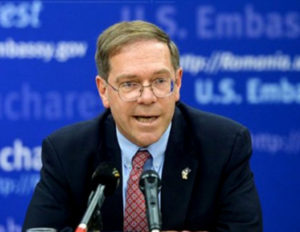
Pres. Donald Trump nominated on Sept. 4, 2018 career Foreign Service Officer Earle Litzenberger to serve as US Ambassador to Azerbaijan replacing Amb. Robert Cekuta who left Baku nine months ago.
A month before the Senate Foreign Relations Committee’s October 4, 2018 hearing on Litzenberger’s confirmation, the Armenian National Committee of America (ANCA) issued a press release urging the Armenian American community, friends of Armenia, and human rights activists to call on their Senators to scrutinize Litzenberger’s nomination.
Aram Hamparian, Executive Director of ANCA, explained that “there’s never been a more urgent need for clarity regarding the nature and scope of American relations with the Aliyev regime. This confirmation process provides a much-needed opportunity for substantive Congressional oversight of an increasingly troubled US-Azerbaijan bilateral relationship, characterized by escalating aggression against Armenians, a worsening crackdown on dissent, and a well-funded campaign to manipulate the American political process.”
Litzenberger has served as Senior Fellow at the German Marshall Fund; Deputy Chief of Mission to the United States Mission to NATO; NATO Deputy Senior Civilian Representative to Afghanistan; Deputy Chief of Mission at the United States Embassy in Belgrade, Serbia; and Deputy Chief of Mission at the United States Embassy in Bishkek, Kyrgyzstan. Litzenberger earned a B.A. from Middlebury College and M.S. from the United States Army War College. He speaks French, Russian, Serbian, and Bulgarian.
During the October 4, 2018 Senate Foreign Relations Committee hearing, Litzenberger came under intense scrutiny. The ANCA reported that Sen. Bob Menendez (D-NJ) referred to Azeri President Ilham Aliyev’s “bellicose rhetoric and sporadic outbursts of violence,” when pressing Litzenberger about Azerbaijan’s violent strategies. Litzenberger responded that he would urge the Azerbaijani government to step back from behaviors that would disrupt the line of contact in the Artsakh conflict. He also stated that the U.S. is working along three lines—the non-use of force, respect for territorial integrity, and the right to self-determination.
In addition, Litzenberger referred to the Organization for Security and Cooperation in Europe (OSCE) Minsk Group, which condemns “any violence and any threat of the use of violence along the line of contact” without specifically citing Azerbaijan’s attacks.
During the hearing, Sen. Menendez inquired whether providing weapons to Azerbaijan should be curtailed based on its human rights violations. Litzenberger responded that the State Department will be careful to ensure its decisions do not undermine efforts to reach a peaceful settlement of the Artsakh conflict. He also mentioned an increased focus on Azerbaijani training in human rights.
Following the hearing, both Sen. Menendez and Sen. Ed Markey (D-MA) submitted written questions to Litzenberger. At the request of Sen. Menendez, the Senate Foreign Relations Committee postponed consideration of Litzenberger’s nomination to an unspecified date. Both Senators may have additional written questions to the nominee as a result of their concerns at National Security Advisor John Bolton’s offer to sell weapons to Armenia and Azerbaijan during his late October trip to the Caucasus.
Litzenberger was the only one of 19 ambassadorial nominations to be postponed, very likely until next year, when the Committee will hold its next business meeting.
ANCA’s Hamparian welcomed Litzenberger’s delay giving the Senators the “opportunity for more careful Congressional oversight of our country’s increasingly challenging bilateral ties with Azerbaijan’s aggressive and abusive Aliyev regime, particularly in light of National Security Advisor John Bolton’s controversial suggestion that the U.S. start selling arms to Baku.”
Hamparian went on to assert: “We join with our Senate friends in seeking greater clarity on this point, and, more generally, regarding the Administration’s policy on Aliyev’s worsening pattern of aggression against Artsakh and Armenia, incitement of hatred against all Armenians, unapologetic blacklisting of U.S. legislators, obstruction of the Royce-Engel peace proposals, threats to shoot down civilian aircraft, the destruction of the Djulfa cemetery and other Christian heritage sites, and – of course – his severe crackdown against domestic dissidents and ethnic-religious minorities.”
Azerbaijan’s Turan news Agency reported the news about the delay of the confirmation of the US Ambassador to Baku. Surprisingly, Turan speculated that Pres. Trump may make a recess appointment taking advantage of the absence of Senate sessions in December, which would mean that the President could appoint Litzenberger as Ambassador to Azerbaijan without Senate confirmation.
Readers may recall that Pres. Obama made such a recess appointment in the case of Matt Bryza dispatching him as Ambassador to Azerbaijan, after Sen. Menendez twice blocked his confirmation. Bryza could only serve in Baku for 12 months before being forced to return to Washington, after the Senate Foreign Relations Committee refused to confirm his nomination.
In the case of Matt Bryza, the Armenian-American community had a good reason to object to his nominations as he had a serious bias against Armenia and favored Azerbaijan and Turkey. However, Litzenberger does not seem to have such biases and there is nothing personal against him. Delaying his nomination is simply a means to ensure that he would defend human rights in Azerbaijan and would urge the Aliyev regime to be less bellicose in the Artsakh conflict. Litzenberger’s delay would also send a message to John Bolton that the Senate does not welcome his offer to sell weapons to Azerbaijan.
The delay of the Ambassador’s Senate confirmation would serve the additional aim of upsetting the Aliyev regime by prolonging the lengthy absence of a US Ambassador to Baku, causing an irritation in Azerbaijan-United States relations.


Be the first to comment